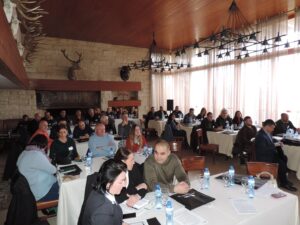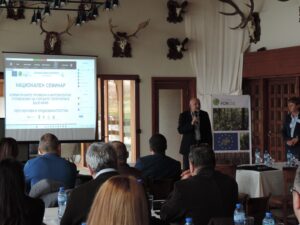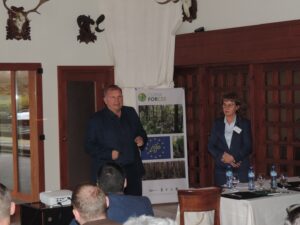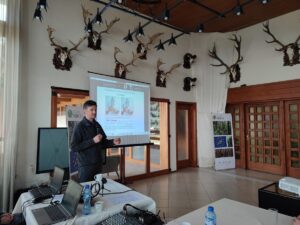The Southwestern State Forest Enterprise carried out a national workshop on “Climate change and smart management of forest areas in Bulgaria – perspectives and challenges”. The workshop was held to consult with stakeholders in the framework of Activity A2 of the Climate Smart Forest Management in Central and Eastern Europe, Project (LIFE19CCA/SK/001276), of which SWSFE is an associated beneficiary. The workshop was carried out at 10.30 a.m. on Monday, 16.01.2023 online and in person in the conference room of the Hunting Home of the State Hunting unit “Vitoshko Studena”. More than 110 representatives of the Ministry of Agriculture, Ministry of Environment and Water, Institute of Forestry, University of Forestry, municipalities, non-governmental nature protection organization and Forestries had the opportunity to learn about the latest trends in climate-smart forest management. Lecturers of the workshop were Associate Professor Dr. Momchil Panayotov, Lecturer at the University of Forestry, Faculty of Forestry; Associate Professor Dr. Lukáš Bilek, Czech University of Natural Sciences (CULS) , Faculty of Forestry and Logging, Prague;, Jan Bahii, PhD, Technical University of Zvolen (TUZVO), Faculty of Forestry, Department of Forest Resource Planning and Informatics, Slovak Republic ; Yana Barzova, WWF Bulgaria, Senior Forest Expert and Prof. Radu Melu, WWF Romania, Forest Programme Coordinator.
The seminar also presented the progress of the CLIMAFORCEELIFE project, under which 1000 ha of coniferous plantations in Vitosko-Studena State Hunting, Radomir Forestry, Nevestino Forestry and Kyustendil Forestry will be thinned using modern methods and a specialized forest machine – Harvester. The different activities will be implemented in order to test which method will be the most effective in transforming the plantations into more resilient ones, especially in relation to fire and climate change. The aim of this project activity is to adapt one of the most vulnerable forests in the country – artificially created coniferous plantations – to climate change. Under the same project, a total of 10 ha of drought resistant tree species (Quercus coccifera, Quercus puebensis, Quercus suber, Quercus ilex, Quercus ithaburensis, Pinus brutia, Cedrus atlantica, Cupressus sempervirens and Pinus nigra) will be established on the territory of the southern state forestries – Petrich, Sandanski and Gotse Delchev. The aim is to test the resilience of the used tree species to climate change through the established experimental crops in the most vulnerable areas of the Southwestern State Forest Enterprise, with a perspective for future large-scale afforestation. The most viable species that successfully adapt to climate change may also provide the best genetic material for future forests.
The workshop finished with discussions on the main issues presented in the lectures’ presentations. Good practices and experiences regarding the project were shared.











